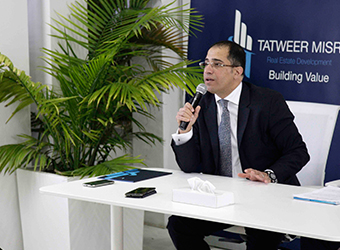Egyptian Real Estate developer, Tatweer Misr signed Wednesday an agreement with the UNICEF and Abdel Wahab Foundation, as part of the Egyptian company’s social responsibility role to focus on art and development.
The agreement will see Abdel Wahab Foundation provide alternative solutions for children and youth at risk of unsafe migration promoting community cohesion and helping young people and adolescents to become self-employed using artistic and vocational training.
The foundation will leverage the International Symposium for Drawing on Walls and Boats held annually in the coastal village of Borollos, overlooking the Mediterranean Sea and Lake Borollos. Renowned Egyptian and international artists from around the globe will gather to provide art and vocational training to youth and adolescents in Borollos and Baltim.
The symposium will take place from 1 to 15 of October, 2017.
The artists will be working through the Abdel Wahab Art Foundation, in coordination with UNICEF, the National Coordination Committee on Combating Illegal Migration, the International Organization for Migration (IOM), and the Ministry of Youth within the framework of Meshwary project.
During the symposium, the artists will also interact with families through UNICEF on initiatives related to positive parenting and early childhood development.
“The encouragement of our creative youth, in projects that add value to our community and drive positive social change, is one of the founding principles of Tatweer Misr,” said Ahmed Shalaby, Tatweer Misr Managing Director.
“Over the years, we have sponsored art symposia as well as various entrepreneurial activities. The current project is an extension of our objectives and exemplifies the importance we place on those issues.” Shalaby added.
Egypt has over a thousand slums boasting a population that exceeds 12 million underprivileged citizens. Unsurprisingly, these conditions have a negative psychological effect on those living in them where they often feel forgotten.
As Shalaby explains, “our goal through this cooperation, is to equip youth in the area with comprehensive skills that would eventually result in sustainable careers. We also aim to bring joy to communities struggling with poverty and neglect through creating job opportunities and providing young people with a sense of hope and faith in their abilities.”
Art has a substantial impact on humans and different colors can have various effects on their behavior and psychology. It can cross borders and build bridges and, if implemented in an insightful and innovative manner, it can be a powerful weapon to catalyze social change. This is the main objective of Abdel Wahab Foundation which was founded in 2014, and promotes enlightenment and sustainable development through art and culture in deprived communities.
The Foundation, according to chairman Abd El Wahab Abd El Mohsen, “aims at empowering youth and children, in deprived and remote communities, by providing avenues of exposure and participation in art and culture.”
This aligns closely with the priorities of UNICEF to engage, advocate, and highlight interventions related to Youth and Adolescents, Early Childhood Development (ECD), and Children on the Move.
As part of the agreement, UNICEF will be responsible for the coordination of the youth and ECD interventions taking place within communities during the symposium.
According to Bruno Maes, UNICEF Representative, “we provide detailed guidance to the artists on how to engage with families and communities on Early Childhood Development (ECD). This includes, for example promoting key practices that parents can adopt on a daily basis like increasing eye contacts and smiling, reading picture books and playing with simple toys with the child involved.” In addition, UNICEF provides a brief on the situation of the community in this area and the different interventions already undergoing with UNICEF’s leadership.
He added: “this will help sensitize the artists to the problems in the area and give them the context of children development.”
The houses that are being painted in Borollos are owned by people with very low income or depend on government subsidies.
“Maintaining a home is the last priority for them,” Shalaby said. Through this project, Tatweer Misr is not only offering free painting of buildings and boats, but also transforming the small village into a living gallery where creative pride is demonstrated in finished houses, and painted boats are sold as pieces of art that reflect the new-found transformation in the area. “This work,” Shalaby added, “helps residents to see their homes and neighborhoods in a new light. The designs and colors can change the local perception of value.”
The symposium will give young people of Borollos a significant opportunity to re-invent themselves and allow professional help in an area of their life which they do not get a chance to nurture often, one that will not only help them obtain new skills and generate a sustainable income, but also develop a new sense of community.
As it stands in 2016, Egypt ranks 120th in the UN’s 2016 world happiness report. The World Happiness Report, reflects growing global interest in using happiness and subjective well-being as primary indicators of the quality of human development. There is nothing more psychologically impactful and cost effective as a simple coat of paint.


